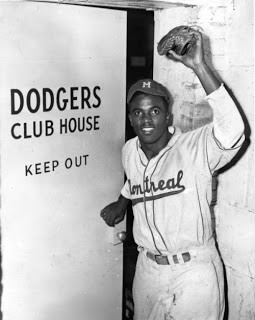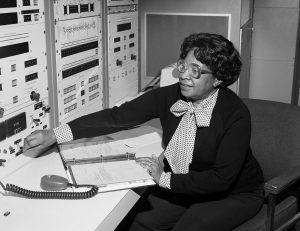"I think I can play in the big leagues. All I am asking for is the opportunity. If I fail, I'll step aside and try to so something else." - Jackie Robinson1Jackie Robinson, a man of courage, determination, and record-breaking events, was born on January 31, 1919, to a single mother who raised him along with four other siblings. This little boy grew up to change the views and opinions of African-Americans playing baseball in the Major Leagues. Jackie Robinson became the figure that would embody African-Americans competing in “a white-man’s game” and broke through that barrier of racism. Through the years growing up, Jackie competed against his older brother, Matthew Robinson, in whatever game they were playing. His older brother competed in the 1936 Berlin Olympics in the 200-meter dash, winning a silver medal just behind Jesse Owens. Matthew was the person who inspired Jackie to pursue his talents and to dream big. That is exactly what younger brother Jackie Robinson did, despite the racial controversy that lay ahead.

Jackie Robinson attended UCLA and became the first student athlete to win varsity letters in all four sports: baseball, basketball, football, and track. Unfortunately, in early 1941, just shy of graduation, Robinson left college “convinced that a college degree would not help a black man get a job during the Great Depression.”2 In the fall of 1941, Jackie moved to Honolulu, Hawaii to play football for a Semi-Professional team called the Honolulu Bears. Sadly, Robinson’s season was cut short due to his enlistment into the Army for World War II. He served in the Army from 1942 to 1944, ranking as high as 2nd Lieutenant. After being honorably discharged from the Army, Jackie Robinson’s life changed the world forever through the sport that he least excelled in, baseball.

The baseball world dealt with its own segregation views. “Segregated baseball showed the great injustice of Jim Crow, yet the Negro Leagues (the generic name for the organized black major leagues from 1920 through the 1940’s) also provided opportunities for black players, executives, and towns to thrive in unequal United States.”3 Jim Crow laws were laws that segregated facilities into white and African-American, and were common throughout the South. The game of baseball in the South only allowed White participants, players, and fans. African-American players, fans, and owners were denied and treated unjustly because of the color of their skin. “Tradition, based on deep-seated racial views of African Americans as inferior in sport, indeed, in all aspects of life, turned out to be the biggest barrier to integration.”4 Jackie Robinson broke these barriers with the help of a man named Branch Ricky.
In 1943, Branch Ricky was the president and general manager of the Brooklyn Dodgers. Ricky believed in Jackie Robinson and knew how talented he was. He wanted Robinson to be out there on the field with other Major League Baseball players, where he belonged, with the best. Branch Ricky was determined to erase the color line in baseball, and he knew Jackie Robinson would be the perfect candidate for this goal. “At the historic interview of August 28, 1945, Robinson expected to be signed to a Brown Dodgers contract but Ricky soon showed his cards. He wanted Robinson to sign with the white Dodgers and become the man who would erase the national pastime’s color line.”5 The famous dialog between Branch Ricky and Jackie Robinson started with Robinson asking Ricky a question that foreshadowed the type of player he would be in the years to come: “‘Mr. Rickey,’ asked Robinson, “do you want a ballplayer who’s not afraid to fight back?’ No, Replied the Dodgers’ president, ‘I want a ballplayer with guts enough not to fight back.’”6

A few months later, in February 1946, Robinson and his newlywed wife, Rachel Isum, his college sweetheart, traveled to Daytona Beach, Florida for the Royal’s spring training camp. “Staring down Jim Crow at Daytona Beach’s City Island Ball Park on March 17, 1946, in an exhibition between the Royals and their big league affiliate, the Dodgers, Robinson became the first black player since Moses Fleetwood Walker in 1888 to take the field against a major league team.”7 Although Robinson was known for being great at baseball, he had a slow start. During camp, when Jackie Robinson did not compete at the standard being set for him, commentators began to question his credentials and accused him of having special privileges. Without being discouraged, Robinson played the game he loved with respect and humility.
Despite how poorly Jackie Robinson was treated because of the color of his skin, he did not let other people’s opinions factor into his mindset. Teams did not want to play the Montreal Royals, because they had an African-American in the line-up. Players also tried to hurt Robinson when he was playing on the field. “In Buffalo, New York, Bison’s players spiked him as they slid into second base, knocking him out of the lineup for three weeks.”8 On April 15, 1947, playing the Boston Braves, Jackie Robinson became the first African-American to play in an official major league baseball game. The Dodgers would go on to win the National League pennant, and Jackie Robinson was named Rookie of the Year in the Major Leagues.

In the next two years, baseball began to slowly integrate; the pressure on Robinson began to ease up. Jackie Robinson went on to be known as one of the greatest baseball players of all time. He remained steadfast in his pursuit for justice and civil rights. He wrote letters to Presidents Harry S. Truman, Dwight D. Eisenhower, John F. Kennedy, and Lyndon B. Johnson thanking them for their support of civil rights. On October 24, 1972, Jackie Robinson died of a heart attack, at the age of fifty-three. His jersey number 42 was retired in 1997. In 2004, Major League Baseball proclaimed April 15th annual Jackie Robinson Day, where the players began to wear the number 42 in his honor. The tradition continues to this day.
- Thomas W. Zeiler, Jackie Robinson and Race in America: A brief history with Documents (Boston: Bedford/St. Martin’s, 2014), 80. ↵
- Thomas W. Zeiler, Jackie Robinson and Race in America: A brief history with Documents (Boston: Bedford/St. Martin’s, 2014), 3. ↵
- Thomas W. Zeiler, Jackie Robinson and Race in America: A brief history with Documents (Boston: Bedford/St. Martin’s, 2014), 6. ↵
- Thomas W. Zeiler, Jackie Robinson and Race in America: A brief history with Documents (Boston: Bedford/St. Martin’s, 2014), 9. ↵
- Thomas W. Zeiler, Jackie Robinson and Race in America: A brief history with Documents (Boston: Bedford/St. Martin’s, 2014), 17. ↵
- Thomas W. Zeiler, Jackie Robinson and Race in America: A brief history with Documents (Boston: Bedford/St. Martin’s, 2014), 17. ↵
- Thomas W. Zeiler, Jackie Robinson and Race in America: A brief history with Documents (Boston: Bedford/St. Martin’s, 2014), 20. ↵
- Thomas W. Zeiler, Jackie Robinson and Race in America: A brief history with Documents (Boston: Bedford/St. Martin’s, 2014), 21. ↵



87 comments
Evelin Joseph
It was so inspiring to read about Jackie Robinson and his fight against racism. It was extremely motivating in the fact that he overcomes all the odds and struggles he faced in his life to become one of the greatest baseball players of all time. It is really depressing to know that baseball in the South only allowed white players and viewers, but it is encouraging to know that men like Branch Ricky and Jackie Robinson were there to fight against this injustice and make history.
Troy Leonard
I have to say, what a great job at how you structured your article about the very inspiring story about Jackie Robinson. his story is very inspiring and it shows what kind of person he is. no matter what kind of obstacle was in front of him he didn’t let it keep him from doing what he loved and that was splaying base ball. this is a great article for people to read if they need some type of motivation.
Ernie Sano
Jackie Robinson is one of the numerous examples of historical figures overcoming odds in order to achieve a personal goal that sets a precedent for everyone afterword. This is not to undermine his achievements. This idea is representing the fact that History is such an amazing topic due to individuals such as Jackie Robinson. People create history, and history is only as interesting and captivating as the people involved. Jackie Robinson sets moral ideals that contribute to the collection of stories and recollections, which has earned him a spot amongst great historical figures throughout time
Abigale Carney
I love baseball, and this story was right up my alley. I never knew than Robinson played football, or enlisted in the Army. He was such a great athlete, lettering in four sports at UCLA is unheard of. When Robinson started baseball, he was segregated from white athletes in the Negro Leagues. I think it is so sad that Robinson was excluded from playing MLB at first just because the color of his skin. I am glad Robinson ignored all of the hate and continued playing the sport he loved because he was one of the best players to ever play the game, white or black!
Mark Martinez
A well written and strong article. I had already known the story of Jackie Robinson but clearly not enough. I had no idea he left college or that he had fought in the military. Let alone became an officer with a honorable discharge. It surprised me that Mr. Robinson had decided to peruse a career in the sport he least excelled at and still became one of baseballs most famous players.
Megan Barnett
Very well written article. The article clearly summarizes Robinson’s life and how he came to end racial segregation in baseball. I liked the facts added in as I didn’t know Robinson served in World War II or that there was even a day dedicated to him. It was also interesting to find out that he was talented in multiple sports and baseball was actually what he was the least good at.
Amber Aragon Alvarado
Jackie Robinson is an absolute inspiration! I enjoyed reading about him and all that he accomplished. The fact that he never gave up despite all the pressure and negativity really demonstrated his ultimate character. Baseball wasn’t even the best sport he was good at, but he knew he had the passion and mindset to excel in the major leagues. After getting out of the military he still found it in him to do what he loves doing and he did it to the best of his ability. Jackie Robinson played a huge role in the civil rights movement without even intentionally doing so. The fact that he never let judgements get in the way of what he loved doing really conveyed an American hero. I loved reading about such a legend. Very well written.
Alejandra Chavez
Growing up as a Dodgers fan, I always heard of Jackie Robinson as being one of the greats. What I didn’t know was that he attended a major university, lettered in all 4 sports, served in the military as a 2nd lieutenant, and after all that, he still went into the Major Leagues. Although he was treated horribly, he still didn’t lose his bearings and played the game with love and respect for the sport. He didn’t let anyone stop him and he paved the way for social justice. Reading this article was very informative and very uprising.
Rebekah Esquivel
This article caught my attention as soon as I saw the title. Baseball is my favorite sport to watch and Jackie Robinson was a major figure in baseball. I was not aware that he was in the military, played football, or went to college. I have heard about what he did for baseball but never anything other then that. This article was very informative and gave me a better understanding on how Jackie was able to make it in the majors.
Justin Garcia
Jackie Robinson is symbol to always pursue your dreams. Everyone is going to face challenges along the way Robinson had to face one of the hardest obstacles in the form of racism. He let his drive carry him through, to his dreams and never let the surrounding opinion affect his aspirations. This article not only gave us insight to his childhood but also early adulthood. Informing us of his time in college as well as his competition with his older brother. This is great to have in an article because it reminds the audience that even though Jackie Robinson is a celebrity he is just a person with dreams to do something great. All in all this was a great read.